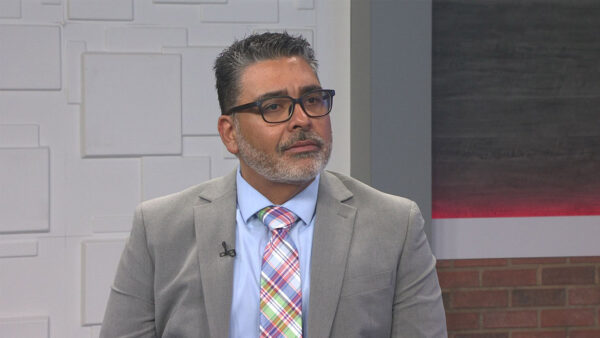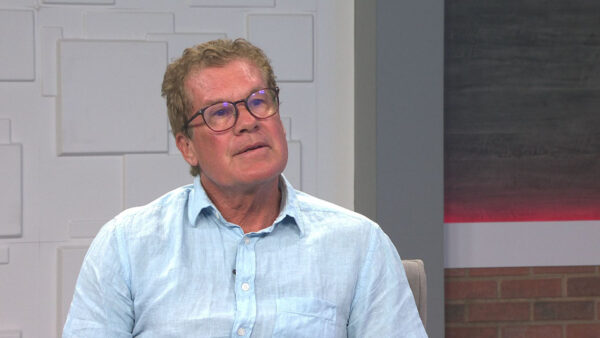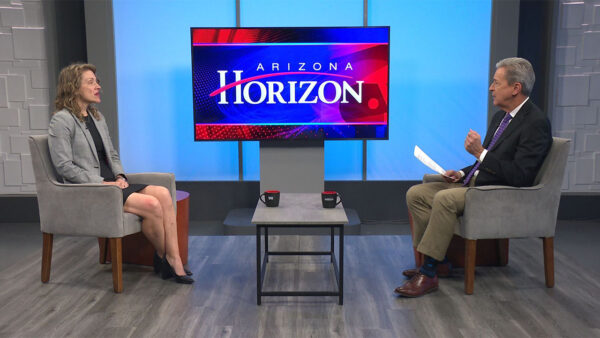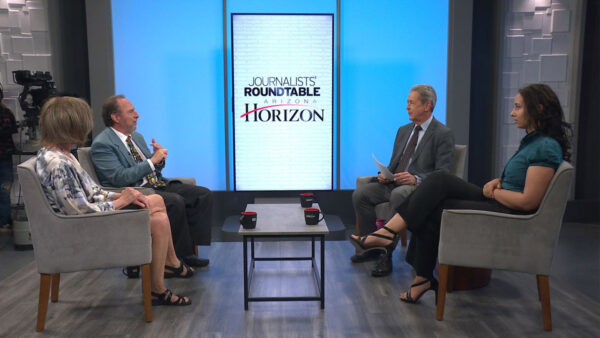The English Language Learner issue has not been resolved, and penalties levied against the state are growing every day. Governor Janet Napolitano will talk about that issue and more during her monthly visit on HORIZON.
Michael Grant:
Tonight on Horizon, the English language learner issue drags on and on at the state's capitol. The latest bill is being readied for the governor. And the senate bill is approved to allocate money for National Guard troops on the border. Issues we'll talk about with the governor. That's next on Horizon.
Announcer:
Horizon is made possible by the Friends of Channel 8. Members who provide financial support to this Arizona PBS station. Thank you.
Michael Grant:
Good evening. Welcome to Horizon. I'm Michael Grant. Before we talk to the governor, $22 million and counting. That is the total amount of fines as of today the state has garnered in the English language learner issue. The senate passed its latest version of the bill today and that clears it through the legislature. It would increase funding for English language learners from $355 a year per student to $422, below the $667 the governor said she would accept. That bill now goes to governor Janet Napolitano. Here to talk about that and other issues on first Thursday, the governor on Horizon is governor Napolitano. Governor, welcome back from Washington.
Gov. Janet Napolitano:
Thank you. Nice to be home.
Michael Grant:
Yeah. You had a busy week. You were there what? Until yesterday?
Gov. Janet Napolitano:
Got back Tuesday night. It was for the national governors meetings. We had 47 governors there. Meeting with the president, various cabinet secretaries and so forth and then various side meetings on Arizona specific issues it. So it was a packed couple of days.
Michael Grant:
All right. Let's start with -- I understand the group met with the president on Monday?
Gov. Janet Napolitano:
Yes.
Michael Grant:
Topics discussed?
Gov. Janet Napolitano:
We met with the president. We talked about Iran and Iraq. We talked about immigration. We talked about the National Guard and the administration's suggestions or plans for the National Guard. It was a very thorough discussion and a very healthy one, I thought.
Michael Grant:
Was Iran and Iraq being discussed from the standpoint of National Guard support from the state level for that effort? Was it discussed on a broader should we be there or should we not basis? What was the focus of the discussion?
Gov. Janet Napolitano:
Well, it was really what are the administration's plans. And the president clearly believes that we're still in the war on terror and Iraq and Iran are part of that. That segued right into guard, you know, where the leak out of the pentagon was they were only going to fund guard at 333,000 positions as opposed to at least the authorized 350. But more than that that they were going to change the composition of the guard and some states were going to lose combat brigades and others were not. There was no detail- no consultation with the governors who are the chief of the guard. Every governor in the United States signed on to a letter to the president saying, wait. Hold your horses. These are our guards. We need them for business in our states. And before any plans are made we need to see and meet with the pentagon and with you, Mr. President.
Michael Grant:
Medicare, Medicaid. What were the topics discussed in that area? I know there was the problem with the so-called dual eligibles as the prescription drug plan came into effect. Arizona had to step forward to cover some of those moneys, I think on a short-term basis.
Gov. Janet Napolitano:
Yes.
Michael Grant:
I think that problem got worked through. Was that one of the topics discussed?
Gov. Janet Napolitano:
Absolutely. Not with the president but with secretary Lovett, the secretary of HHS and his staff. But here's the problem. When they enacted Medicare part D, they required that all citizens on Medicaid now had to transfer on to Medicare. Those are what are called the dual eligibles. Eligible for Medicaid and Medicare. It was not a smooth transition so they were getting their drugs, their prescriptions, whatever, on Medicaid in Arizona without a co-pay or anything else. Then all of a sudden they go to Medicare and their names aren't on the list and people can't find them and they can't get prescriptions filled. And so a number of governors, myself included, used some of our health crisis funds to kind of bridge the gap as it were, under-- with the assurance of the HHS secretary that we would be reimbursed for those expenses. And so we talked with the secretary about how that reimbursement would occur and as of what date.
Michael Grant:
Is the check in the mail?
Gov. Janet Napolitano:
The check is not in the mail because the transition isn't over yet. And so we said rather than arbitrary deadline, you ought to get far enough in, so we make sure that the toll of people has smoothly transferred.
Michael Grant:
Has it-- we last visited that subject, I don't know, maybe 5, 6-weeks ago. Has it smoothed out?
Gov. Janet Napolitano:
It has smoothed out in Arizona. We still have some cases but calls to our hot line are way down. And I think in part because of the way we manage our Medicaid patients. I think our transfer overall was much smoother in states for example compared to California where they've got several hundred million dollars to come up with now.
Michael Grant:
The report was you were meeting with secretary defense Rumsfeld concerning the request for federal funding for troops on the border. Did that meeting come off?
Gov. Janet Napolitano:
Yeah. Well I met with, governors met with secretary Rumsfeld and that was an extremely frank discussion about the National Guard. -- That was a closed door session but an extremely frank session. Then afterwards he and I met privately to talk about the federal government picking up some of the tab for our guard at the border. We currently have guard at the border doing support missions. And this is a very important point to make. The guard is not going to be policing the border. That's the border patrol's job, that's civilian law enforcement. But what they can do is backup, drug trafficking task forces, monitor surveillance posts and that sort of thing. We think we could use more guard down there. I think the federal government ought to pay for them.
Michael Grant:
I guess I can certainly understand the surveillance functions. But how is a National Guard unit well trained and well equipped to do, for example, drug enforcement?
Gov. Janet Napolitano:
Well, they work on a task force basis with civilian law enforcement and they get trained. They're certainly not trained at enforcing the immigration laws. That's the border patrol's function. It would take a lot of retraining to have National Guard in that capacity as it would if we were to use civilian law enforcement for the border patrol function because that's a whole different body of law. But there are a number of things that our guard can do to alleviate that from the border patrol so they can focus solely on the border enforcement. It all needs to be connected together and it needs to be mission specific and it needs to be well trained. But we do have National Guard and troops we could send down there. And again there is a bill coming through the legislature that for state money we may get there and they have to do that. I think the first task ought to be to the department of defense.
Michael Grant:
You anticipated my follow-up question. I think the senate has cleared a bill, I don't think the house has taken action, but it would allocate about $10 million in state money to fund the guard at the border. I think, consistent with the duties and responsibilities you just outlined. Are you favorably inclined to the bill or not?
Gov. Janet Napolitano:
Well, I'm favorable to getting more guard at the border. The question is can the legislature mandate that? No, that's the executive. The executive-the governor is the "commander in chief." It would be as if the congress were telling President Bush you must send troops here or there. That's not the way our system works. So that's a problem. The other problem is, I've given the legislature an integrated $100 million package for the border, not just for National Guard but to support local law enforcement, more police, more deputies, greater GPS capability, technology at the border. I think these all ought to be put in together so we see an integrated package that focuses on the border in a number of different levels.
Michael Grant:
But in your state-of-the-state address, you said -- and we've talked a couple of times about, let's get the guard down on the border. I do want it funded by federal moneys.
Gov. Janet Napolitano:
Right.
Michael Grant:
And you have talked about it being a transition device as hopefully border patrol continues to ramp up its personnel level.
Gov. Janet Napolitano:
That's right. I've never said we wouldn't use state money for that. I've always said, no, let's first go the federal route because it's their responsibility. They should be paying for this just as they should be paying us as incarceration costs. Arizona taxpayers are really getting hurt by the federal government's stinginess when it comes to the border. But we'll take it one day at a time. Without expressing any opinion on the National Guard bill we are preparing mission specific plans for expanding the National Guard at the Arizona border.
Michael Grant:
Understood, and I by no means want to let the federal government off the hook on it, but that can be, it seems to me, an accounting issue if you feel the guard ought to go down to the border, legislature steps forward and says, here's $10 million to make it happen, continue to hammer on the federal government but you've got a mission funded that in the state-of-the-state you said was a good idea.
Gov. Janet Napolitano:
Right. And like I said, I'm not expressing an opinion on the bill. But there's language in the bill that's constitutionally very troublesome. And let me just say that. I think we can get there from here without the bill. I think we can get there with funding that we have that we're looking at right now and address the future funding in the '07 budget. So we'll see. But I think you can rest assured that over the next months we will be expanding National Guard presence at the border in a support role to the border patrol.
Michael Grant:
Okay. Let me cycle back to your -- you stressed it was a very candid discussion with secretary of defense Rumsfeld about the guard. Was it basically saying, we're the governors? Don't mess with the guard as you're proposing to do? Cuts back its levels, reassign its missions? Is that what the candid discussion was about?
Gov. Janet Napolitano:
The candid discussion was about the fact that we were being given oral assurances as to troop strength, troop composition, equipment replacement for all the equipment we've left in Iraq, our guards have left in Iraq. That needs to be replaced now the troops are back here. But nowhere in the president's budget do you see the numbers reflected to meet the oral commitment. So there is a disparity between what the administration has put in writing and what they're telling the governors orally. And that's got everybody's ears perked up pretty high.
Michael Grant:
Was this is full group on national governors meeting with Rumsfeld?
Gov. Janet Napolitano:
Yes.
Michael Grant:
Was that the across the board reaction?
Gov. Janet Napolitano:
Oh yes. I think the leading voices were republican governors.
Michael Grant:
All right. Well listen, let's shift to English Language Learning. While you were gone, well, actually you've been back.
Gov. Janet Napolitano:
I've been back, yeah.
Michael Grant:
But partly while you why gone legislature has moved another version of English Language Learning I want to get into the details in just a minute. But first let me ask you generally, do you think progress is being made on the issue?
Gov. Janet Napolitano:
Well, you know, the bill has now arrived at my desk this afternoon. And I will have to take action on it. I will do that with all -- as speedily as I can, probably tomorrow, as a matter of fact. But I don't think enough progress was made. It's a better bill than the first two that I vetoed. I actually vetoed three now. It's better. It doesn't have a $850 million corporate tax credit on it, for example.
Michael Grant:
Has no corporate tax credit.
Gov. Janet Napolitano:
Has no tax credit at all. We got rid of that. It does have some additional funding on a per pupil basis. But it doesn't satisfy the ongoing need for funding nor does it have a number that any study that I've seen supports. So, you know, the question is, for me, do you veto it again and send it back and with any expectation that they're going to move at all now that they have majorities in both houses? Or do you let it go and shift the fight to the courtroom venue? And that's the decision I'll need to make. And I'll make it very speedily.
Michael Grant:
Is there another viable possibility to let it go into law without your signature?
Gov. Janet Napolitano:
Yes. Oh yeah. Those are the three options actually. You sign it, let it go without a signature. You would typically do that with a statement of why you're not signing it or veto it.
Michael Grant:
Okay. Senate president Ken Bennett was on the program a couple of days ago talking about the bill. He said that it gives you the amount of money that you had asked for in your proposed budget. Is that true?
Gov. Janet Napolitano:
No. He must be adding the fines to that. Because remember the fines, that you referenced at the start of the show, are by court order supposed to be used for English Language Learning. So maybe he's adding those things together.
Michael Grant:
He said basically that you had proposed in your budget -- and I'm hamstrung here because quite honestly I haven't reviewed your budget on this point - but this is what the senate president said: that you had proposed $45 million in annual funding for English language learners.
Gov. Janet Napolitano:
For the classroom part.
Michael Grant:
And the legislature in this version of the bill is authorizing $45 million.
Gov. Janet Napolitano:
Yeah. What he's not telling you is that a third of that is for administrative expenses in the department of education. It's not for in the classroom. The key question is, what's the per pupil allocation. And it doesn't meet with what I had asked for. So again the decision I need to make and I'll probably make it tonight and announce it tomorrow is, do I go ahead and sign the bill into law? Do I let it go into law without signature with reasons or do I veto it. And the criteria or the issue for me is, is there a realistic expectation that the legislature will compromise even more than they already have, and they haven't compromised that in my view enough or do we shift this to a courtroom?
Michael Grant:
We've already discussed the fact they've come off the tuition tax credit. They have come up-
Gov. Janet Napolitano:
On the numbers.
Michael Grant:
On the numbers. And it also seems to me that they have gone through something of a shift from the standpoint that there's not this -- I keep referring to it as a grant program --
Gov. Janet Napolitano:
They've addressed.
Michael Grant:
They've moved off of that point.
Gov. Janet Napolitano:
So there's been movement. But again, I would just say after the 9 months of negotiation, one would wish this would have been done more quickly, more expeditiously and more thoroughly. But we're there now, the bill is on my desk and I will act, as I said, probably tomorrow.
Michael Grant:
I'm going to get off this. But I want to ask one more point that the senate president raised. There's apparently inside the bill a two-year limitation on funding for English language learners. Some find that offensive. The senate president said, well, listen, here's our rationale for that. If you don't have some limitation on how long a student can remain in a English Language Learning program, there's going to be this perverse incentive for the school district in order to continue to qualify for funding in year three, year four, year five to say, no, I'm sorry. They're not yet qualified.
Gov. Janet Napolitano:
You know what? He used that in negotiations with me. I said, give me an example. Show me where that's been a problem in the past. This is kind of hypothesizing it could happen this way. The problem was-- two years actually is not a bad number. If you have a provision that says -- and if a student is going to take a year longer, the school district can apply for a waiver and get an additional year's funding for that. Because most of the studies about E.L.L. say it takes from one to three years. So they picked two. That's a good, average number. But they didn't build into it any wiggle room for a student who may take a little extra time.
Michael Grant:
Let me move to immigration policy. I know you and the Utah governor had been working on a plan to try to get to congress. I think you referred to it as a sense of the western governors.
Gov. Janet Napolitano: We did.
Michael Grant:
On that general public.
Gov. Janet Napolitano:
Absolutely.
Michael Grant:
I think that popped.
Gov. Janet Napolitano:
It popped on Tuesday. The western governors and republican alike all endorsed a proposal, governor Huntsman from Utah and I were the two lead governors for the western governors, a joint op-ed. It was in the paper this morning and being pushed around the country. And basically what we're saying is, look, we need a tough and realistic immigration policy. It chute incorporate a number of things, federal law enforcement, man power and technology, it should incorporate building a regional western regional prison to house illegal immigrants who have violated state law so we get out of this business about not being reimbursed by the federal government for prison costs, it should include a more expeditious process for being to get visas. Right now if you're a legal resident from Mexico residing in United States and you want to bring say, your wife over, it takes on average 6 years to get the appropriate visa. Talk about incentive for illegal immigration to join a family back together. So the visa system needs to be improved. It needs to include a guest worker program to match the economic reality that we're all experiencing. And it ought to provide for the 11 million undocumented already in this country that if they pay an appropriate sanctions, which in our view is a substantial fine, pay their taxes and work here for a certain number of years, no criminal record, no anything else they have a way to earn their citizenship.
Michael Grant:
Would the McCain-Kennedy bill on that particular point be correct in your opinion?
I want to say there was a $2,000 fine and there was a 5-year.
Gov. Janet Napolitano:
2,000, 2500, yeah. Obviously the McCain bill is the one the western governors think is the best start. They're beginning to mark those bills up this week in the congress. I think on be half of myself and the western governors I have actually spoken with, this notion that for the 11 million undocumenteds here that they're going to deport in order to come back legally, we find that to be inadequate. We just think it's unrealistic.
Michael Grant:
When you were back in Washington, did you get much of a read, the senate is starting to mark up the bill. I heard a variety of opinions, and I'm sure you have to, over the past 2, 3, 4 months as to whether something is going to move this year, will not move this year. What's the latest read that you have?
Gov. Janet Napolitano:
Well, you know, the question is do they move anything? And if they move anything will it be a good bill? Because the problem is if they move a bad bill we'll be stuck with it for the next ten years. Because immigration is not a topic they like to take up. It's difficult for a lot of reasons and for a lot of ways.
Michael Grant:
Is that primarily because it's perceived as being a loser politically in November regardless of which way you jump?
Gov. Janet Napolitano:
Possibly. But it's an issue that has a lot of levels to it. We have kind of the Russell Pearces of the world out here who want to turn everything into an immigration problem and kind of pound their chests and say we're against illegal immigration. I don't know anybody a single person in favor of illegal immigration. The question is, what is the best way to rectify a broken immigration system? We believe as western governors and again bipartisan that you can't just do it with law enforcement. We've been pouring federal law enforcement into the Arizona-Sonora border. We still have illegal immigration coming across. You've got to deal with it these other issues: the visas, the guest worker and by the way, the employer sanctions.
Michael Grant:
I interrupted you. Was there a sentiment something would move?
Gov. Janet Napolitano:
You know, we talked to the president about it. He very much is behind the guest worker program and so forth. So no one was willing. It was interesting. Nobody was willing to predict.
Michael Grant:
All right.
Gov. Janet Napolitano:
So I won't, either.
Michael Grant:
Okay. Arizona governor Janet Napolitano. Thank you very much. Welcome back to Arizona.
Gov. Janet Napolitano:
Thank you. Always good to be back.
Michael Grant:
The winter of 2005-2006 could go into the books as the driest ever. It is all part of a severe dry period that began 10 years ago approaching the epic drought proportions of the 1950s. Producer Tony Paniagua has more on that on what's shaping up to be a very serious situation.
Tony Paniagua:
You know the desert has been extra dry when even the native plants are having a tough time. Many prickly pears and other specimens are showing significant signs of stress, which will only be relieved by rainfall. But that isn't expected anytime soon.
George Montgomery:
Very wrinkled flesh. The pads are very thin, they're yellowed compared to the watered prickly pear. The plant has almost a wilted appearance to it, which is surprising to think of with a cactus. But definitely shows in prickly pears without the rain for the last few months.
Tony Paniagua:
George Montgomery is a curator of botany at the Arizona Sonora desert museum west of Tucson. He's lived in this area all his life. And these dry conditions are some of the worst he's witnessed.
George Montgomery:
This winter is extremely dry. So we're seeing some of the same conditions that we did for a couple of summers and where jojobas were even dropping leaves and an amount of versage, prickly pears, died around the ground. Palo Verde trees even begin to start yellowing, dropping twigs and then whole branches if it continues.
Tony Paniagua:
This lush and healthy plant at the museum receives supplemental water. A few feet away another one does not. It is struggling for survival.
Unknown:
If we don't get any additional rain in February this year, then this will be the driest winter.
Tony Paniagua:
Scientists describe our present conditions as extreme, a d 3 on a scale from D 0 to D 4. D 4 is the worst on the U.S. drought monitor. This other graph shows a rainfall deficit of more than 4 inches in the past few months in northern Arizona. Normally the Tucson metropolitan area gets about 12 years per year.
Glen W. Sampson:
Well from the September through January period, Tucson has had the least amount of rain ever in a record. And Tucson records started around 1894 and we're looking over 110 years where we've had the driest period from September through January. Which is fairly significant.
Tony Paniagua:
These dry conditions are causing special concern for people who have to battle wildfires because at higher elevations the cactus get replaced by pine trees and other vegetation which is also very dry and can burn easily. The U.S. forest service has obtained additional personnel and funds to deal with this drought which is only expected to get worse in the next few weeks.
Glen W. Sampson:
Our normal fire season starts around the first of April. We're looking at fires burning now. As far as fire season starting from a weather standpoint we're already in it.
Tony Paniagua:
The high probability of below precipitation -- it's a vicious circle in some ways. The less rain we get, the more likely people will use more water. Therefore they decrease the supply.
Glen W. Sampson:
When you miss the winter rains it tends to keep the vegetation drier. Drier conditions are quite prevalent as we go into the springtime where we start heating up and warming up and drying out more.
George Montgomery:
Supplemental water I think is a good way to help keep your thing things going until the rains come.
Tony Paniagua:
Fortunately, the Sonoran desert has evolved over many years. Cyclical droughts have been part of the picture. So some plants may be destroyed by the dry conditions. Generally speaking this habitat should be able to stand up to this natural challenge.
Michael Grant:
Please join us for the Friday journalist roundtable edition of Horizon. We'll discuss the week's news events. Thanks very much for being here on a Thursday. I'm Michael Grant. I hope you have a great one. Good night. ¶¶[Music]¶¶
Announcer:
If you have comments about Horizon, please contacts at the addresses listed on your screen. Your name and comments may be used on a future edition of Horizon. Horizon is made possible by the friends of channel 8, members who provide financial support to this Arizona PBS station. Thank you.
Arizona Governor Janet Napolitano:;





















